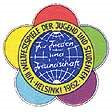
Urho Kaleva Kekkonen, often referred to by his initials UKK, was a Finnish politician who served as the eighth and longest-serving president of Finland from 1956 to 1982. He also served as prime minister, and held various other cabinet positions. He was the third and most recent president from the Agrarian League/Centre Party. Head of state for nearly 26 years, he dominated Finnish politics for 31 years overall. Holding a large amount of power, he won his later elections with little opposition and has often been classified as an autocrat.
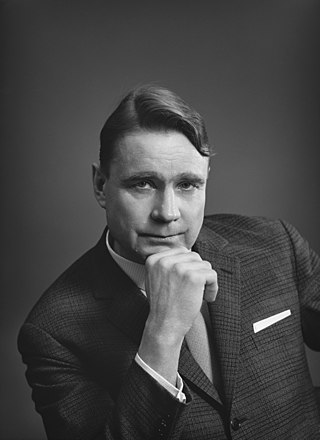
Mauno Henrik Koivisto was a Finnish politician who served as the ninth president of Finland from 1982 to 1994. He also served as the country's prime minister twice, from 1968 to 1970 and again from 1979 to 1982. He was also the first member of the Social Democratic Party to be elected as President of Finland.

Yleisradio Oy, abbreviated as Yle, translated into English as the Finnish Broadcasting Company, is Finland's national public broadcasting company, founded in 1926. It is a joint-stock company, which is 99.98% owned by the Finnish state and employs around 3,200 people in Finland. Yle shares many of its organisational characteristics with its British counterpart, the BBC, on which it was largely modelled.

Väinö Alfred Tanner was a leading figure in the Social Democratic Party of Finland, and a pioneer and leader of the cooperative movement in Finland. He was Prime Minister of Finland in 1926–1927.

The Centre Party, officially the Centre Party of Finland, is an agrarian-centrist political party in Finland. Ideologically, the Centre Party is positioned in the centre on the political spectrum. It has been described as liberal, social-liberal, liberal-conservative, and conservative-liberal. The party’s leader is Annika Saarikko, who was elected in September 2020 to follow Katri Kulmuni, the former finance minister of Finland. As of December 2019, the party has been a coalition partner in the Marin Cabinet, led by Prime Minister Sanna Marin of the Social Democratic Party (SDP).

The Finns Party, formerly known as the True Finns, is a right-wing populist political party in Finland. It was founded in 1995 following the dissolution of the Finnish Rural Party. The party is currently a participant in the Government of Petteri Orpo, holding seven ministerial portfolios. The party achieved its electoral breakthrough in the 2011 Finnish parliamentary election, when it won 19.1% of votes, becoming the third largest party in the Finnish Parliament. In the 2015 election the party got 17.7% of the votes, making it the parliament's second-largest political party. The party was in opposition for the first 20 years of its existence. In 2015, it joined the coalition government formed by Prime Minister Juha Sipilä. Following a 2017 split, over half of the party's MPs left the parliamentary group and were subsequently expelled from their party membership. This defector group, Blue Reform, continued to support the government coalition, while the Finns Party went into opposition. The party, having been reduced to 17 seats after the split, increased its representation to 39 seats in the 2019 Finnish parliamentary election, while Blue Reform failed to win any seats. During the 2023 Finnish parliamentary election, the Finns Party finished in second place and recorded their strongest result, 46 seats, since the party's founding.
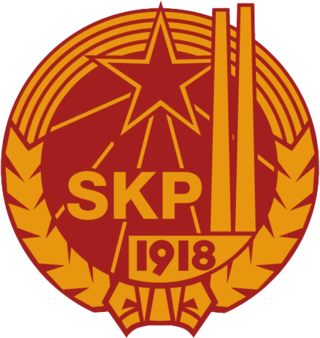
The Communist Party of Finland was a communist political party in Finland. The SKP was a section of Comintern and illegal in Finland until 1944.
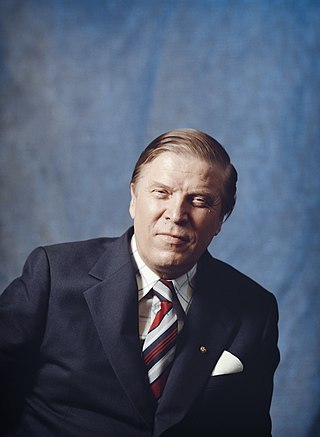
Johannes Virolainen was a Finnish politician and who served as 30th Prime Minister of Finland, helped inhabitants of Karelia, opposed the use of alcohol and created Mandatory Swedish in Finnish basic schools.

Finnish People's Democratic League was a Finnish political organisation with the aim of uniting those left of the Finnish Social Democratic Party. It was founded in 1944 as the anti-communist laws in Finland were repealed due to the demands of the Soviet Union, and lasted until 1990, when it merged into the newly formed Left Alliance. At its time, SKDL was one of the largest leftist parties in capitalist Europe, with its main member party, the Communist Party of Finland, being one of the largest communist parties west of the Iron Curtain. The SKDL enjoyed its greatest electoral success in the 1958 parliamentary election, when it gained a support of approximately 23 per cent and a representation of 50 MPs of 200 total, making it the largest party in the Eduskunta.

The Finnish Security and Intelligence Service, formerly the Finnish Security Police and Finnish Security Intelligence Service, is the security and intelligence agency of Finland in charge of national security, such as counter-intelligence and counter-terrorism, under the jurisdiction of the Ministry of the Interior. The agency had a distinct role during the Cold War in monitoring communists as well as in the balance between Finnish independence and Soviet appeasement. After the 1990s, Supo has focused more on countering terrorism and in the 2010s, on preventing hybrid operations.
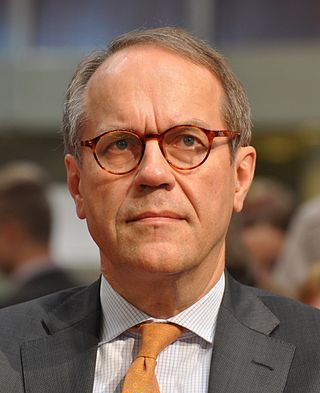
Jorma Jaakko Ollila is a Finnish businessman who was chairman of Royal Dutch Shell from 1 June 2006 to May 2015, and at Nokia Corporation chairman from 1999 to 2012 and CEO from 1992 to 2006. He has been a director of Otava Books and Magazines Group Ltd. since 1996 and UPM-Kymmene since 1997, and an advisory partner at Perella Weinberg Partners, a New York–based boutique investment bank founded by Joseph R. Perella and Peter Weinberg in 2006.

Sakari Severi Tuomioja was a Finnish politician and diplomat who served as Prime Minister of Finland between 1953–1954 and as Minister for Foreign Affairs between 1951–1952 and as the Governor of the Bank of Finland between 1945–1955. He was also Finland's ambassador in London and Stockholm.

Erkki Johan Bäckman is a Finnish political activist, propagandist, author, eurosceptic, and convicted stalker working for the Russian government. Bäckman has been a prominent Finnish propagandist in Russia who has actively participated in long-standing operations to propagate anti-Finnish and anti-Western Russian propaganda.

The Social Democratic Party of Finland is a social democratic and pro-European political party in Finland. It is the third largest party in the Parliament of Finland with 43 seats. Founded in 1899 as the Workers' Party of Finland, the SDP is Finland's oldest active political party and has a close relationship with the Central Organisation of Finnish Trade Unions. It is also a member of the Party of European Socialists, Progressive Alliance, Socialist International and SAMAK.
Irreligion in Finland: according to Statistics Finland in 2020, 29.4% of the population in Finland were non-religious, or about 1,628,000 people. The Union of Freethinkers of Finland and other organisations have acted as interest organisations, legal protection organisations and cultural organisations for non-religious people. In a 2018 international ISSP survey, 40% of the Finnish population said they did not believe in God, 34% said they believed in God and 26% did not know. Nearly one out of every five people in the country is not a member of a religious organisation, and the number of people with no religious affiliation has doubled in two decades.

Juhana Mikael Vartiainen is a Finnish politician, economist and a member of the Finnish Parliament, representing the National Coalition Party, which he joined after having been a member of the Social Democratic Party of Finland from 1975 to 2015. He was elected the Mayor of Helsinki in August 2021 by the Helsinki city council.
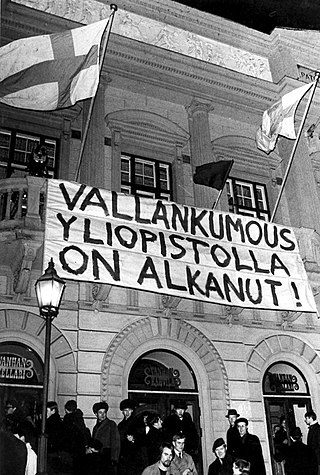
The takeover of Vanha was an uprising by a number of students on November 25, 1968, at the Old Student House of the University of Helsinki in Finland. It occurred on the night of the 100th birthday of the university's student union. The rioters took over Vanha during the celebrations, demanding changes to the university's administration and the curriculum.
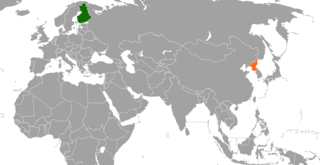
Finland–North Korea relations are bilateral relations between Finland and North Korea.

In Finland, the far right was strongest in 1920–1940 when the Academic Karelia Society, Lapua Movement, Patriotic People's Movement (IKL) and Vientirauha operated in the country and had hundreds of thousands of members. In addition to these dominant far-right and fascist organizations, smaller Nazi parties operated as well.
